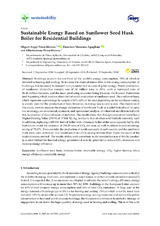Sustainable Energy Based on Sunflower Seed Husk Boiler for Residential Buildings
Autor
Perea-Moreno, Miguel Ángel
Manzano Agugliaro, Francisco
Perea Moreno, Alberto Jesús
Editor
MDPIFecha
2018Materia
Sunflower seed huskBiomass boiler
Renewable energy
CO2
Higher heating value
Energy efficiency
Sustainable energy
METS:
Mostrar el registro METSPREMIS:
Mostrar el registro PREMISMetadatos
Mostrar el registro completo del ítemResumen
Buildings account for one third of the world’s energy consumption, 70% of which is
devoted to heating and cooling. To increase the share of renewables in the energy consumption of
buildings, it is necessary to research and promote new sources of green energy. World production
of sunflower (Helianthus annuus) was 47.34 million tons in 2016, with a harvested area of
26.20 million hectares, and the main producing countries being Ukraine, the Russian Federation,
and Argentina, which produce about half of world production of sunflower seed. The sunflower husk,
which represents a percentage by weight of 45%–60% of the seed depending on the sunflower variety,
is widely used for the production of feed; however, its energy use is very scarce. The objectives of
this study were to analyse the energy properties of sunflower husk as a solid biofuel and to carry
out an energy, environmental, economic and operational analysis of a thermal installation fed with
this by-product of the sunflower oil industry. The results show that this agro-industrial waste has a
Higher Heating Value (HHV) of 17.844 MJ/kg, similar to that of other solid biofuels currently used.
In addition, replacing a 430 kW fuel oil boiler with a biomass boiler of the same capacity fed by this
biofuel can avoid the emission of 254.09 tons of CO2 per year, as well as obtain an annual energy
saving of 75.47%. If we consider the production of sunflower seeds in each country and the sunflower
husk were used as biofuel, this would result in a CO2 saving of more than 10 per thousand of the
total emissions emitted. The results of this work contribute to the standardization of this by-product
as a solid biofuel for thermal energy generation due to its potential to reduce CO2 emissions and
increase energy efficiency.

